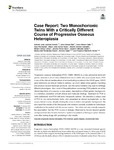Case report: two monochorionic twins with a critically different course of progressive osseus heteroplasia

Ver/
Use este enlace para citar
http://hdl.handle.net/2183/40328
A non ser que se indique outra cousa, a licenza do ítem descríbese como Creative Commons Attribution 4.0 International License (CC-BY 4.0)
Coleccións
Metadatos
Mostrar o rexistro completo do ítemTítulo
Case report: two monochorionic twins with a critically different course of progressive osseus heteroplasiaAutor(es)
Data
2021-06-23Cita bibliográfica
Justicia-Grande AJ, Gómez-Ríal J, Rivero-Calle I, Pischedda S, Curras-Tuala MJ, Gómez-Carballa A, Cebey-López M, Pardo-Seco J, Méndez-Gallart R, Fernández-Seara MJ, Salas A, Martinón-Torres F. Case report: two monochorionic twins with a critically different course of progressive osseus heteroplasia. Front Pediatr. 2021 Jun 23;9:662669.
Resumo
[Abstract] Progressive osseous heteroplasia (POH; OMIM 166350) is a rare autosomal-dominant genetic disorder in which extra-skeletal bone forms within skin and muscle tissue. POH is one of the clinical manifestations of an inactivating mutation in the GNAS gene. GNAS gene alterations are difficult matter to address, as GNAS alleles show genetic imprinting and produce several transcript products, and the same mutation may lead to strikingly different phenotypes. Also, most of the publications concerning POH patients are either clinical depictions of a case (or a case series), descriptions of their genetic background, or a tentative correlation of both clinical and molecular findings. Treatment for POH is rarely addressed, and POH still lacks therapeutic options. We describe a unique case of POH in two monochorionic twins, who presented an almost asymptomatic vs. the severe clinical course, despite sharing the same mutation and genetic background. We also report the results of the therapeutic interventions currently available for heterotopic ossification in the patient with the severe course. This article not only critically supports the assumption that the POH course is strongly influenced by factors beyond genetic background but also remarks the lack of options for patients suffering an orphan disease, even after testing drugs with promising in vitro results.
Palabras chave
POH
Genetic diseases
Monochorionic twins
Progressive osseous heteroplasia
Treatment
Genetic diseases
Monochorionic twins
Progressive osseous heteroplasia
Treatment
Descrición
Case report
Versión do editor
Dereitos
Creative Commons Attribution 4.0 International License (CC-BY 4.0)
ISSN
2296-2360






